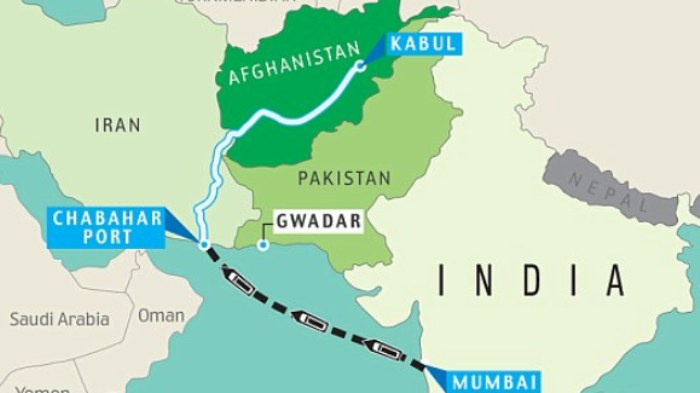Transition for Three: Construction of Chabahar Port brings much-needed leeway for Tehran, Delhi and Kabul

(Chabahar route towards Kabul and Mumbai. Source: Daily Mail)
On Sunday, Afghanistan’s Foreign Minister Salahuddin Rabbani arrived in Tehran to discuss issues of common interest with counterpart Mohammad-Javad Zarif and Secretary of Supreme National Security Council Ali Shamkhani, Press TV reported.
At the top of Rabbani’s agenda lies the fight against terrorism and drug trafficking as well as ‘avenues for strengthening political and economic cooperation’.
In the meantime, Secretary of Iran’s Supreme National Security Council (SNSC) Ali Shamkhani was on a visit to India to discuss opportunities for intelligence and security cooperation.
What lies in between, is an important pact recently agreed among Iran, India and Afghanistan to use Chabahar Port, southeast Iran, as a transit hub, which allows Indian goods to reach Afghanistan through Iran. The corridor links ports in the western coast of India to the Chabahar Port and covers the road and rail links between Chabahar and the Afghan border. Hailed in India as a ‘rebellion against history’, a ‘game-changer’ and ‘a masterstroke’, the agreement’s real significance for India is in its potential to link India with Central Asian markets and even serve as a shortcut to Europe, since the country’s neighbors in north and east, China and Pakistan, do not provide a convenient path, if any. As far as Afghanistan is concerned, Afghan ambassador to India, Shaida Abdali, has wrapped it up. “This is a very, very crucial agreement for Afghanistan. The opening of this corridor will help us to fully reach our potential, give us a new trade route. This is a completely new chapter,” the Wire quoted him as saying in April.
Iran, India and Others
India will invest more than $500 million in the next year and half for the development of the Iranian port, under the trilateral transit agreement. In a separate bilateral agreement between the bigger two, Iran gives India the right to develop two berths in the Chabahar Port and operate them for 10 years through India Ports Global, in partnership with Iran’s Aria Banader, which will bring more than $300 million, financed by the country’s National Development Fund.
On the drawing board for over a decade, the transit agreement was delayed mainly because of the oppressive sanctions against Iran. Now in the post-deal era, it seems that Iran is gradually adopting more ambitious and active policies regarding economic collaboration within the region. What becomes more significant is Iran’s art of gaining concessions.
Some say the new deal will help India counter the growing influence of China, which has invested in Pakistan’s Gwadar port, in the region and that it could be met with backlashes in China and Pakistan. If Iran can dismiss ramifications with China, given the top-level collaborations between the sides, Iran should not forget possible responses from Pakistan, despite the recent pact’s many economic benefits. Some have already gone so far as to blame Pakistani groups for sporadic assassinations in southern Iran. According to Iran’s ambassador to Pakistan Mehdi Honerdoost Iran had invited both Pakistan and China to contribute to the project before India, but neither expressed interest in joining.
Indian affairs' analyst Mandana Tishehyar tells Iranian Diplomacy that it is unlikely for a boost in Iran-India cooperation to hinder Iran’s ties with Pakistan. “Iran is quite familiar with Pakistan’s role in maintaining peace and stability in the region and has never sought to isolate Pakistan,” she said. Reiterating that leaders in both countries have so far quickly resolved any challenges brought up in their relations, she advises Tehran to maintain the balance in its cooperation with India and Pakistan.
However, competition over Chabahar is more than a simple regional one. Tishehyar, who has visited the port a few weeks ago, says the Chinese, Arabs, Malaysians, Russians and even more recently Europeans are also joining foreign investors.
“Capacities created in the port has prepared it to jumpstart its significant role not only in the maritime silk road connecting East Asia to Eurasia but also in launching a south-north corridor from Persian Gulf to Russian ports,” Tishehyar said, stressing the potential in Chabahar to turn into a modern trade hub in Asia. She went on to say that she saw among the port’s official the will to expand cooperation between Gwadar and Chabahar Port to give rise to opportunities to attract more international investors.
Nonetheless, in a final analysis, Iran seems to be willing to lean toward India, an outlook exemplified in Shamkhani’s remarks Saturday during his meeting with Indian National Security Advisor Ajit Doval in New Delhi. Shamkhani expressed Iran’s readiness to revive trilateral cooperation with India and Russia on security issues in the region, particularly on ways to prevent the spread of terrorism and help establish stability and security in Afghanistan, Press TV reported.
Indian subcontinent expert Pirmohammad Mollazehi is not much optimistic about trilateral cooperation. “Pakistanis oppose any plans, even construction projects, implemented by Indians in Afghanistan,” he told Iranian Diplomacy in an interview. He argues that the United States is trying to make Iran involved in different regions “to suppress the energy coming from the Islamic Revolution”, as has already happened in in Syria, Iraq, Yemen, and Bahrain. Therefore, with problems in these countries yet to be resolved, Iran should not help make another front against itself in the east.
Tehran will also have to soothe domestic opposition from the Principlist camp. In fact, in February, days before the parliamentary election, a number of hardliner Principlists launched attacks on the Rouhani administration for its allegedly clandestine ties with Hinduja group, an Indian corporation based in London. They tracked the group down to the $600m deal back in 2004, inked with Iran’s Ports and Shipping Organization to develop the Port of Chabahar on a BOOT basis, which is quite the very recent pact signed on Chabahar, halted due to the sanctions imposed on Iran.
Iran, Afghanistan and Others
To see the rapid progression of Iran-Afghanistan bilateral economic ties, note how abandoned ones are being renewed in the wake of the Chabahar agreement. Earlier this month, Eklil Ahmad Hakimi, the Afghan finance minister, and Iran’s interior minister RahmaniFazli co-chaired the two-day fifth edition of the joint commission of Iran and Afghanistan cooperation. The fourth edition of the joint commission which includes four separate committees on “trade, transit, insurance, banking and investment”, “energy, agriculture, irrigation and telecommunications”, “culture and science”, and “consular and security affairs”, was held in 2011. Just mid-July, Iran’s Khorasan Razavi Province was reported to see a 180 percent hike in its imports from Afghanistan, while exports to Afghanistan surpassed $219 m.
Despite close economic ties and longstanding friendship between the two states, Iran and Afghanistan suffer from some long unresolved tensions, too. As a July article published by Peace Research Institute of Oslo puts, one of the most contested problems, not expected to be eased in the near future, is the conflict over water.
“What started as a problem of border delineation has become a trans-boundary water management problem, which also encompasses the other major shared water resource, the Harirod-Murghab basin" Afghanistan affairs' expert Pirmohammad Mollazehi tells Iranian Diplomacy. "The lack of agreements affects the livelihoods of millions of inhabitants of both basins. It also poses environmental dangers for the volatile Sistan wetlands. The development of hydro-electric power, such as through the Salma hydroelectric dam along the Harirud, is also likely to heighten tensions between the two countries, as the dam will likely affect the amount of water available to Iran.”
With Kamal Khan dam becoming operational since 1970s, Iran’s Sistan has been wrestling with drought and immigration of its population to Gorgan, Mashhad and other cities as well as the suburbs of Tehran. Hari River and the Salma dam, recently finished by Indians, can also jeopardize Khorasan’s reserves of drinking water, if it fails to stream enough water into Iran–Turkmenistan Friendship Dam Mollazehi reminds.
According to Mollazehi, a prevalent mentality in Afghanistan is that waters with their sources in Afghanistan exclusively belong to country, against international regulations. However, Iran’s laxity is also part of the problem. “There are ways to make deals through negotiations; when you give the green to Afghan to use Chabahar, to gain access to a free port in the Indian Ocean, you can demand the settlement of Helmand River’s water allocation,” Mollazehi adds.
Apart from these, Iran’s political influence in Afghanistan is experiencing a decline. “Afghanistan is currently somewhat a challenge among key regional and international powers. The war taking place in Afghanistan is a kind of proxy war, in which every country involved seeks certain interests of their own. The truth is that Pakistan has the upper hand and this can be explained when seen against the backdrop of Islamabad’s relations with India,” Mollazehi told Iranian Diplomacy. Other competitors definitely include the US and NATO, given the fact that they have direct military involvement and have intervened in Afghanistan’s power structure to make a government in which a Western inclination is dominant to a large extent, Mollazehi says. Thus, he argues, it is no surprise that the northern forces once supported by Iran, Russia and India are now sensing that it would more advantageous for them to become coordinated with the US.
Iran is engaged in an ideological conflict in Afghanistan too, with yet another rival, namely the Saudis. “While Tehran prefers a kind of [supra-sectarian] convergence in the region, the Saudis have no interest in unity” Mollazehi adds. The rivalry is best exemplified in the Saudi’s building an Islamic center on a hilltop in central Kabul to house up to 5,000 students, right after reports that Iran would build cultural institutes in Herat. However, the rivalry does not amount to a Shia/Sunni conflict. “Traditionally, there is a spirit of religious toleration in Afghanistan between Sunnis and Shiites,” Mollazehi reiterated.
Iran is however alert on security issues in Afghanistan, as it has been since the US invasion.
“Afghanistan must not be allowed to become a backyard for terrorists and an effective campaign against terrorism in Afghanistan requires political stability,” Larijani said in a meeting with Afghanistan’s Foreign Minister Salahuddin Rabbani in Tehran on Sunday. He emphasized that the Islamic Republic will always stand by the Afghan people and support the country's national unity government.
Afghanistan has a twofold potential, Mollazehi argues. “If it has peace and stability and could set out its development, this could also benefit Iran, but speaking of security, Afghanistan's security challenges can spill over into other countries in the region”.
Mollazehi says Uzbek, Chechen, Afghan, Uyghur and Central Asian forces that are all now fighting in Syria and Iraq at a military leadership level will send their forces to north Afghanistan if Daesh/ISIS is defeated in Syria and Iraq vis-à-vis Iran and Russia. “They will go to Fergana Valley to exert pressure on Central Asia and Russia’s security domain. If the same forces go to regions like Helmand, Zabol, and Nimruz, they will be sharing borders with Iran and they have enough motivation for entry into Iran to make trouble”.
And a piece of good yet unsolicited news for Iran regarding security is what Press TV quoted Rabbani as saying to Larijani. “Afghanistan would never allow anyone to use its soil against a third country”.


